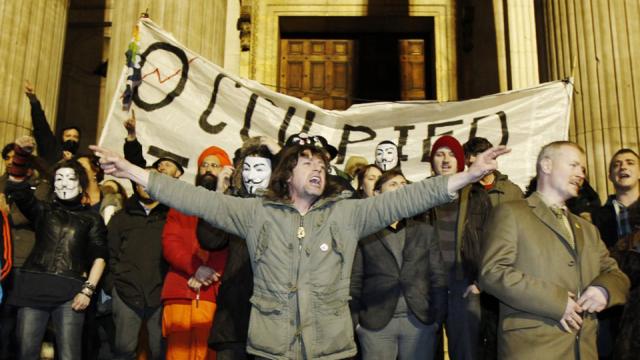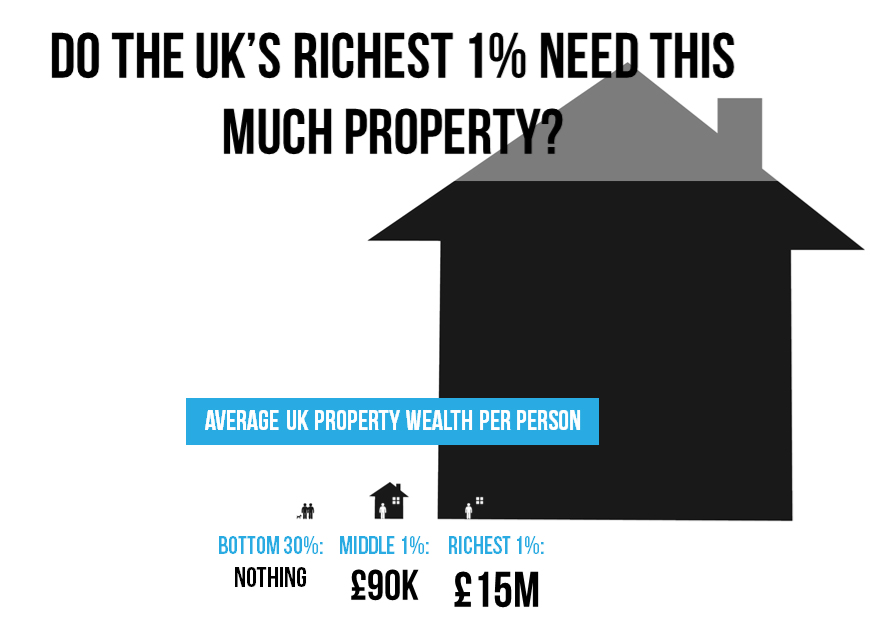
“Following World War II, the U.S. dollar was adopted as the world's reserve currency against the wishes of the pre-eminent economist John Maynard Keynes," Joel Benjamin tells me, "cementing the economic and political power of the U.S. Federal Reserve."
Benjamin works as the local authority manager for the U.K. campaign Move Your Money and is investigating how much public money authorities lost in the financial crisis. Founded in early 2012, Move Your Money — which has parallel groups like this oneoperating in the U.S. — has helped over 2 million people in the U.K. transfer their finances from unethical too-big-to-fail banks to smaller, safer institutions.
The Federal Reserve holds a significant responsibility for the 2008 global crash, Benjamin explains. In particular, Alan Greenspan's ultra-low interest rate policies — known as the "Greenspan put" — encouraged the housing and stock market bubbles to dangerously inflate throughout the early 2000s.
“The Fed is staffed by insiders from within the banking industry, and this determines its direction. We see a similar trend with the appointment of Goldman Sachs’s Mark Carney to the Bank of England,” Benjamin says, and "of course, the Fed’s global economic power is further extended by U.S. military industrial hegemony.”
"When the crash happened, bigger financial institutions such as JPMorgan Chase and Goldman Sachs were bailed out with TARP (Troubled Asset Relief Program) funds and went on to profit massively buying up distressed assets, while other smaller banks were allowed to sink. Too big to fail has gotten even bigger since the crash.”
To head off another financial meltdown, the British organization Positive Money is calling for drastic changes to the Bank of England, something akin to the growing calls in the U.S. to democratize the Fed — literally, to federalize it and alter its objectivesso that it serves the public's interest.
A core aspect of the Positive Money campaign is to analyze and explain how money is created. Currently, the vast majority of British money is created by privately owned banks as debt. Only 3% of money in the U.K. exists physically in notes and coins.
But the group asserts this economic reality is rarely taught in most economics departments, let alone understood by many politicians -- and even less so by the average citizen. Like the FedUp100 campaign which seeks to nationalize the Federal Reserve, bringing it under control of the U.S. Treasury enabling the government to create dollars debt- and interest-free, Positive Money advocates restructuring the British monetary system so it too works for the 99%.
The group's founder, Ben Dyson, assesses how the Fed, the Bank of England and both nations' monetary systems run on very similar lines. “The BoE and Fed have the power to create money, yet until the 2008 crisis it was mainly created by privately owned banks, and this went into property and the financial markets, not the productive economy,” Dyson says.
“As debt creation creates money, and people were paying back loans, the economy was effectively shrinking,” he continues, and "to remedy this, both central banks started creating money through Quantitative Easing (QE), again fueling speculation.”
Citing analyses undertaken by Positive Money, Dyson asserts that this strategy undermines the central banks’ very reason for enacting QE, purportedly so that the money fuels production in the economy. “In the U.K., from the £375 billion ($614 billion) that [they] pumped into the banks, only £30 billion ($49 billion) went into the productive areas of the economy," Dyson says. "The extent QE failed is clear because at the same time Britain teetered on the edge of going into a triple dip recession, its stock market was at a record high.”
These are the same criticisms people have been making, with growing clamor, since the Fed initiated its QE spending in 2010. Since the financial crash, both the Fed and Bank of England have been running these stimulus programs — a "money for nothing" technique of buying bonds from toxic banks. As Dyson mentions, the U.K. has created an extra £375 billion for big banks through the spending.
Meanwhile, Professor David McNally of York University Toronto calculates the Fed has pumped an equivalent amount, $600 billion, into Wall Street banks in the course of QE1, QE2 and QE3. He asserts this “hot money” is funding speculators to buy currencies, commodities and assets with the result that it's driving up currencies such as Brazil’s real, funding lands grabs across Africa and Asia, and making food prices soar.
A deeper look at the Fed’s impact on food prices, in fact, illuminates how the private central bank is working as an engine to fund rising inequality worldwide.
Backing up McNally’s assertions, the Guardian reports that QE has meant that commodity markets like food are being overwhelmed with investors who are focused on making the highest returns. The increased speculation has driven food prices to record levels, according to Britain's World Development Movement.
To appreciate the consequences that food speculation has had on the majority of the globe's population, I asked Miriam Ross, media officer for WDM in London, to set out its impact. “Speculation has been a major contributor to the sharp spikes in global food prices," Ross said. "When prices of staple foods rise suddenly, everyone is affected. Here in the U.K., for example, prices rose by 32% [between] 2007 to 2012.”
Ross went on, “With incomes failing to keep pace, many people have felt the pinch. But in poor countries, where many people typically spend 50 to 90% of their incomes on food compared to an average of 10 to 15% in rich countries, price spikes can spell disaster. In the last six months of 2010 alone, 44 million more people were pushed into extreme poverty by rising food prices.”
“This does not just mean peoples’ lives are devastated due to a hunger and malnutrition. It causes people to sell off possessions including cattle, take their children out of school, or cut out spending on health care,” she added, and proposed that reducing speculation should be an easy goal for the public to embrace.
“Regulation to curb speculation is on the table on both sides of the Atlantic. Whether or not regulators seize the opportunity to rein in the speculators depends on whether they prioritize the profits of investment banks or the fundamental right of people to food.”
That the Federal Reserve and the Bank of England are encouraging food speculation — and are responsible for its disastrous results — shows clearly how both America's and Britain's monetary policies are engineered to work against the interests of the majority, not only at home but internationally.
An alternative strategy, according to groups like Positive Money, is for the nation's central bank to strategically stimulate parts of the economy and help produce the things that people actually need, like low-carbon emitting forms of transportation, manufacturing, energy production, and so on. If the Fed were federalized, restructured as a public force for investing in the public good, not just Americans but the world's population would have a more hopeful future before it.
3 WAYS TO SHOW YOUR SUPPORT
- Log in to post comments
















